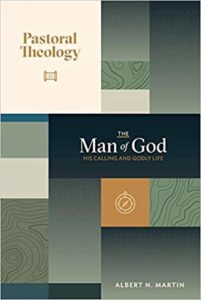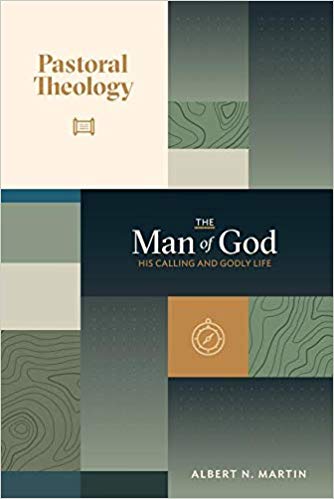
Albert N. Martin, The Man of God: His Calling and Godly Life. Trinity Pulpit Press, 2018.
More than a century ago James Stalker warned:
I believe the question, what is to be the type and the tone of the ministry in any generation, is decided in the theological seminaries. What the students are there, the ministers of the country will be by-and-by. . . The state of feeling in a theological seminary ought to be such, that any man living a life inconsistent with his future profession should feel thoroughly uncomfortable, and have the conviction driven in upon his conscience every day, that the ministry is no place for him. (Yale Preaching Lectures, 1891)
If theological students are to live consistently with their calling to the pastoral office, both in seminary and after, then the nature of that call and the character of the minister must weigh upon them heavily. The full gravity of that weight can be obtained only by a careful study of the scriptures, a life of prayer, the examples of men devoted to the pastoral office, and the reading of books that uphold the best of the Reformed pastoral tradition. Which is why, after its 2018 publication, I immediately made Albert N. Martin’s The Man of God: His Calling and Godly Life (the first of a projected three volumes in pastoral theology), required reading for my first year students.
On full display is the author’s pastoral wisdom, obtained through a long and fruitful ministry – 46 years of which were spent as pastor of Trinity Baptist Church in Montville, New Jersey. During his tenure, he delivered the pastoral theology lectures at Trinity Ministerial Academy. Many pastors my age benefitted from those lectures when they were distributed on cassette tapes. To have them available in print will prove a great encouragement to the next generation of ministerial students and pastors.
An ever-present danger exists that seminary students will underestimate the responsibilities of their pastoral office, and leave school with unrealistic expectations and without a comprehensive view of what the ministry requires. Martin alerts young ministers to what lies ahead, even as he reminds older ministers of the duties that belong to them as shepherds of God’s people.
There are three reasons ministers – and especially young ministers – should read this book:
(1) The author’s pastoral experience. Now in his eighties, Martin’s writings in pastoral ministry will undoubtedly prove to be the capstone of his service to God’s church. His work has been carried out in the daily life of pastoral ministry, with all its joys and sorrows, encouragements and frustrations, trials and triumphs.
Young ministers need experienced wisdom. They may lack older mentors. Or, when serious conversations about ministry take place, they are only with fellow ministers their same age. Books like this will enable them to enjoy the mature wisdom of pastors who have labored long, hard, and faithfully for Jesus.
(2) The author’s experience of lecturing to pastors. Preparing lectures is demanding work. Good lectures require sustained reflection on the topic at hand. I cannot imagine a more comprehensive treatment of the pastor’s call and character than is found here. In addition to the contents already described, the author gives attention to topics such as establishing a balanced reading program, fighting temptations to laziness, earning trust, dress and appearance, safeguarding pastoral integrity, and many others.
(3) The author’s deep acquaintance with the classic Reformed texts in Pastoral Theology. While at seminary, I want my students to begin a life-long habit of reading the best in pastoral theology. Extensive quotes from the classic works of Richard Baxter, William Blaikie, Charles Bridges, Patrick Fairbairn, Thomas Murphy, John Owen, and many others point readers to solid resources for further study and inspiration. I would encourage young ministers to begin a file of helpful quotes, and also a list of books to read in the years ahead.
The book focuses on two areas: the call of the man of God and the life of the man of God.
The Call of the Man of God
John Newton was correct: “None but he who made the world can make a minister of the gospel.” (17) And the God who makes ministers, Martin argues, has entrusted to the men he calls and to the church that calls them, the solemn duty of identifying the distinguishing traits and gifts required for the pastoral office.
No man should be admitted to the pastorate solely on the basis of his preaching gifts. A thorough self-assessment and assessment by the church is essential. The book’s first unit contains sustained and thorough teaching on the call to pastoral office, describing in detail the various qualifications for ministry in character, Christian experience, and intellectual, speaking, and leadership gifts.
A pastor’s Christian character must be balanced. For example, “a man with great moral courage who obviously lacks sensitivity to people is a man whose character is out of balance. The same is true of a man who has great sensitivity to people, but who lacks moral courage.” (75)
The Life of the Man of God
Martin begins his second unit – the Life of the Man of God in the Pastoral Office – with this assertion: “sustained effectiveness in pastoral ministry is generally realized in proportion to the health and vigor of the pastor in his relationship to God, the church, himself, the management of his time and manifold responsibilities, and his family.” (227) He reminds his fellow pastors that “it is what we are before God that determines the character and usefulness of our ministries.” (233)
The examination of the minister’s life is thorough. Chapters are devoted to the minister’s relationships: to God spiritually, intellectually, physically, and emotionally; to his people; to his wife and children; and his relation to himself.
The minister must have an experiential acquaintance with God and his truths, lest his ministry be powerless. Without that acquaintance, James Stalker observes, his “hearers may not know why their minister with all his gifts, does not make a religious impression on them; but it is because he is not himself a spiritual power.” (237) The minister must apply himself to the diligent use of means: the devotional assimilation of the Word of God, the habit and spirit of secret prayer, and the maintenance of a good conscience. The pastor embraces these means in the context of a ministry that is marked by various levels of suffering.
No small part of a seminary’s work is to prepare men to enter the ministry with eyes wide open to its attendant temptations, to the opposition of men that accompanies faithful ministry, and to the difficulties associated with laboring in bodies weakened by infirmity. How much crippling disappointment comes to new ministers because they know neither the cost of faithful ministry nor the concomitant truth that it is in the context of suffering that the minister learns to rely not upon self, but upon God who raises the dead. (2 Corinthians 1:9)
The author’s warnings are timely. Our society has unparalleled access to materials that defile body and soul. The wise minister does not forget that “the first step to apostasy is thrusting away a good conscience – not necessarily sound doctrine or good morals, but a good conscience.” (271)
Martin writes, “I am conscious of my accountability to God in discharging my stewardship of this instruction in pastoral theology.” (3) It seems to this reviewer that he has discharged that responsibility admirably. I enthusiastically recommend this book, both to young ministers who want to begin ministry on a solid biblical footing, and to seasoned pastors who want to stay the course and finish well.
